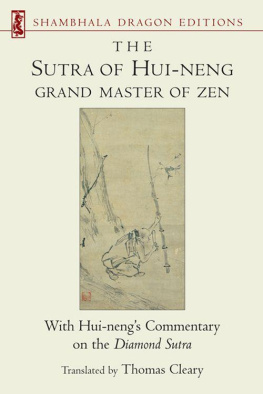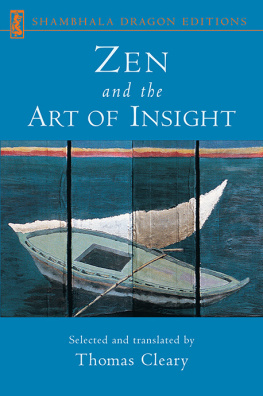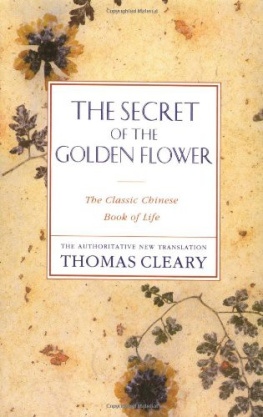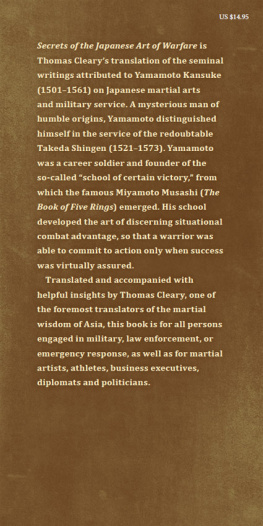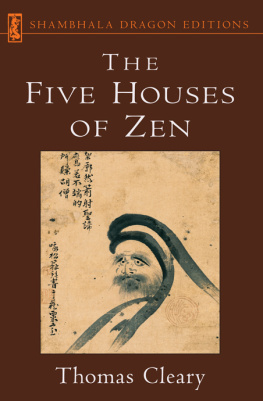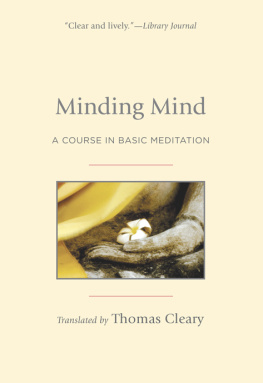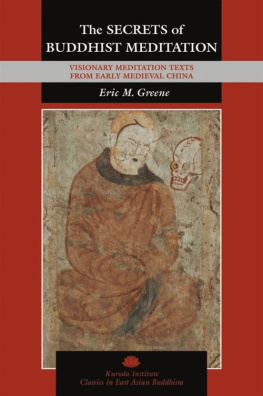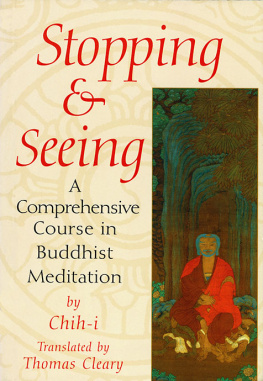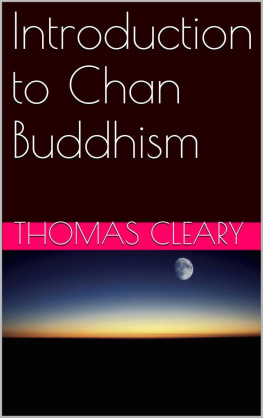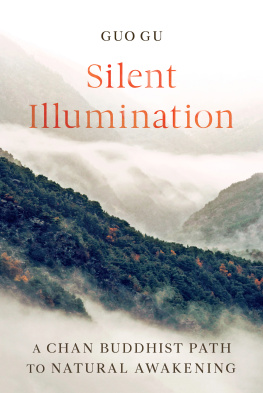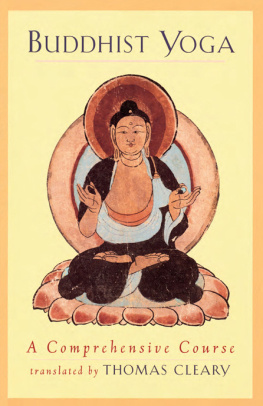Thomas Cleary - Chan Buddhist Meditation
Here you can read online Thomas Cleary - Chan Buddhist Meditation full text of the book (entire story) in english for free. Download pdf and epub, get meaning, cover and reviews about this ebook. year: 2015, genre: Religion. Description of the work, (preface) as well as reviews are available. Best literature library LitArk.com created for fans of good reading and offers a wide selection of genres:
Romance novel
Science fiction
Adventure
Detective
Science
History
Home and family
Prose
Art
Politics
Computer
Non-fiction
Religion
Business
Children
Humor
Choose a favorite category and find really read worthwhile books. Enjoy immersion in the world of imagination, feel the emotions of the characters or learn something new for yourself, make an fascinating discovery.

- Book:Chan Buddhist Meditation
- Author:
- Genre:
- Year:2015
- Rating:5 / 5
- Favourites:Add to favourites
- Your mark:
- 100
- 1
- 2
- 3
- 4
- 5
Chan Buddhist Meditation: summary, description and annotation
We offer to read an annotation, description, summary or preface (depends on what the author of the book "Chan Buddhist Meditation" wrote himself). If you haven't found the necessary information about the book — write in the comments, we will try to find it.
Chan Buddhist Meditation — read online for free the complete book (whole text) full work
Below is the text of the book, divided by pages. System saving the place of the last page read, allows you to conveniently read the book "Chan Buddhist Meditation" online for free, without having to search again every time where you left off. Put a bookmark, and you can go to the page where you finished reading at any time.
Font size:
Interval:
Bookmark:
Chan Buddhist Meditation
Introduction
Chan Buddhism is known as the school of direct pointing to the human mind, to see its essence and realize enlightenment. The fundamental technique employed to produce this result is called reversing attention to look back, meaning to turn attention away from the contents of the mind to focus on the essence of awareness itself. The aim is to attain independence, free from the influence of external indoctrination and internal compulsion. There are many traditional sayings and stories used to promote this process, both directly by fostering this mental posture, and indirectly by clearing the mind of distracting thoughts. In addition, there are some works especially devoted to describing procedures and problems of Chan meditation, including the use of sayings and stories.
The text translated here follows on many centuries of Chan practice and experience. The author, Chan master Wuyi (1575-1630), commonly known as Boshan after a place where he taught, was one of the most distinguished Buddhist teachers of the late Ming dynasty in China. The Ming dynasty had been founded by a leader of a millenarian movement who subsequently sought to contain and control Buddhism institutionally to prevent the rise of similar movements. Chinese Buddhism, as well as Taoism and Confucianism, had already suffered stagnation under the repressive regime of Mongol warlords during the preceding dynasty, so Chan was in a critical state of decline by Boshans time. This gave rise to the practice of meditation intensives, periods of special concentration intended to break through the institutional accretions and spiritual lethargy of the times.
Warnings to Beginners doing Meditation
Doing meditation first requires a firm determination to break through birth and death, seeing through the world, the body, and the mind as all conditional, with no real autonomy. If you dont discover the great principle inherent in you, then the mind being born and dying will go on uninterrupted, the murderous demon of impermanence will not stop for a moment. Then how can you fend it off?
Use this one thought as a piece of brick to knock on the door. Be as if you were sitting in a bonfire, trying to get out. You might take a step at random, but you cant halt in your tracks. You cant think of anything else, and you cant seek help from anyone else.
At such a time, you can only plunge straight ahead without worrying about the fire, without worrying about yourself, without looking for someone to help, without having another thought, unwilling to delay for a moment.
If you can get out, youre skillful.
In doing meditation, its important to develop wondering. What is wondering? For example, you dont know where you came from when you were born, so you cant help wondering where you came from. You dont know where you go when you die, so you cant help wondering where youre going.
When you cant break through the barrier of birth and death, wondering arises at once. It coalesces before your eyes, so you cant set it down or chase it away.
Suddenly one day you break through the mass of wonder. Then the words birth and death are useless furniture.
An ancient adept said, Wonder a lot and your awakening will be great; wonder little and your awakening will be little. If you dont wonder at all, you wont ever wake up.
When doing meditation, stick the word death on your forehead; regard your flesh and blood body and mind as if dead, just keeping the thought of seeking enlightenment before you.
This thought is like a long sword hanging in the air. If you touch the blade, it cannot be grasped. If you clear away obstruction and whet the blunt, the sword is long lost.
When doing meditation, most of all beware of addiction to a state of quietude. That causes people to stagnate in lifeless silence, unawares and undiscerning.
People get tired of activity but not stillness. If seems to me that travelers are always in places where there is a lot of commotion, so once they experience a state of quietude it is like eating candy or honey. It is like people wanting to sleep when theyre tired out. How can they know themselves?
Other religions mortify their bodies and minds, turning them insensate; they also seek entry by way of quietude. It seems to me that over years and years of deadening and desensitizing, and silencing and stilling, one will deteriorate into an ignoramus, no different from an inanimate object.
We sometimes resort to states of quietude, but it is only to awaken understanding of the momentous event of being.
This only works if you are not cognizant of being in a state of quietude. If you look for any semblance of stillness in the momentous event of being, you cannot find it at all. This is attainment.
When doing meditation it is essential to be centered, balanced, and strong enough to detach from the human condition. If you react emotionally, then you wont be able to do meditation. Not only will you be unable to do it; eventually youll wind up following a commonplace preacher, without a doubt.
When you do meditation, you do not see the sky when you look up, you do not see the ground when you look down. When you look at mountains theyre not mountains, when you look at rives theyre not rivers. When you walk you dont know youre walking, when you sit you dont know youre sitting. In the midst of a crowd you dont see a single person. Your whole being, inside and out, is just one single mass of wondering.
This can be called homogenizing the world. The key to meditation is the commitment not to stop until the mass of wonderment breaks.
What does homogenizing the world mean? The universal principle that has always been there has never stirred, absorbed in silence and stillness. What is required is for the person concerned to rouse the spirit, so that the sky revolves and the earth turns, finding within oneself the capacity to make waves.
When doing meditation, dont fear dying and being unable to come to life; just fear living without being able to die.
If you are able to stay right with the feeling of wonder, states of agitation will spontaneously disappear without having to be dispelled. The wondering mind will spontaneously be clear without having to be cleared. All the senses will naturally be open, immediately effective and responsivewhy worry about not coming to life?
When youre meditating efficiently, its like carrying a half-ton load that you cant put down even if you try, like looking for something essential thats been lost, unwilling to relax until its found. Just dont get fixated, infatuated, or philosophicalfixation produces sickness, infatuation produces bedevilment, and philosophizing produces cultism.
When you actually attain single-mindedness and total concentration, it is like looking for something lost. Then those three types of problems melt into irrelevance. As it is said, if you excite the mind and stir thoughts, you turn away from the substance of reality.
In doing meditation, when you bring a saying to mind, you must be thoroughly clear, like a cat catching a mouse. An ancient referred to this when he threatened to kill a cat if no one could say anything appropriate.
Otherwise, if you sit inside a ghost cave, completely immersed in utter darkness all your life, whats the benefit of that?
When a cat is getting ready to pounce on a mouse, even if there is a chicken or a dog nearby the cat pays no attention, because its only intent on catching the mouse. Those who practice Chan should also be like this: its just a matter of determination to understand this principle, such that no matter what happens you dont have time to pay any mind. The moment you have any other thought, not only do you lose the mouse, but even the cat as well.
When doing meditation, each day you should see what you have accomplished that day. If you waver and vacillate, youll never be done.
Next pageFont size:
Interval:
Bookmark:
Similar books «Chan Buddhist Meditation»
Look at similar books to Chan Buddhist Meditation. We have selected literature similar in name and meaning in the hope of providing readers with more options to find new, interesting, not yet read works.
Discussion, reviews of the book Chan Buddhist Meditation and just readers' own opinions. Leave your comments, write what you think about the work, its meaning or the main characters. Specify what exactly you liked and what you didn't like, and why you think so.

